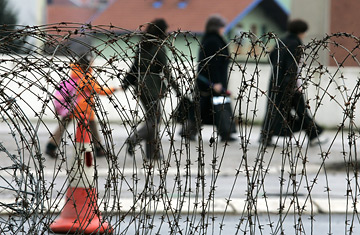
The main bridge in the ethnically divided Kosovo town of Mitrovica, December 10, 2007.
Today the international community's deadline for the final attempt to hammer out a negotiated solution to the problem of Kosovo's future expired. The international "troika" overseeing talks between Kosovo Albanians, who want independence from Belgrade as soon as possible, and Serbs, who are willing to grant only a greater degree of autonomy, delivered their report on the talks' failure to the U.N. Security Council. The breakdown has raised fears of renewal of violence in the region. But while tensions are indeed rising, there are sound reasons why the worst-case scenarios — including new conflict in the Balkans — probably will not be realized.
Kosovo Albanian leaders are anxious to declare independence in coordination with the European Union, even if the U.N. Security Council remains blocked on the issue. The new country, if it is born, will rely heavily on E.U. backing and needs to maintain good relations with European capitals. Several Wstern powers, for their part, are fed up with Russia's and Serbia's refusal to budge on the question and have indicated a willingness to help Kosovo Albanians achieve their goal. And while Serbia has warned that it is prepared to implement tough measures against Kosovo if the province follows through on promises to declare independence unilaterally (probably by next spring), Belgrade will almost certainly stop short of steps that would endanger its own future.
The "troika" — representatives of U.S., E.U., and Russia — officially declared on Monday that the four-month-long talks between Kosovo and Serbia have failed. From the beginning, it was clear that there was very little common ground between the parties: the Kosovo Albanians opted for nothing less than independence, while Serbs vowed that they would never accept it. Belgrade now says it is ready to retaliate against Kosovo if it tries to secede, as well as against any country that chooses to recognize it.
Last week, Russian foreign minister Sergei Lavrov echoed those threats by saying that unilateral secession of Kosovo was "unacceptable." "The tensions are already rising in the whole region," Lavrov said in an interview to a Cypriot news agency. Cyprus, Greece, Spain, Romania and Slovakia are the only E.U. member countries that remain resistant to Kosovo's independence.
But what can Serbia really do if and when Kosovo declares independence and gets recognized by the bulk of the Western world? Serbian Foreign Minister Vuk Jeremic said on Dec. 4 that Belgrade's diplomatic response to the recognition of the breakaway province would be within a wide spectrum from "the very mild to the very tough, the toughest one being cutting off diplomatic relations with countries which violate the territorial integrity and sovereignty of Serbia." Other measures may include imposing an economic embargo on Kosovo, stirring trouble in Bosnia-Herzegovina and other neighboring states, and turning to Russia for a deeper strategic partnership.
As far as an economic embargo is concerned, Kosovo looks like an easy target. With a territory some seven times larger than Kosovo's and with a population five times as big, Serbia looms heavily over the province. Furthermore, some 70% of Kosovo's consumer goods come from Serbia, and so does much of its electricity supply. In theory, the embargo would cripple Kosovo's already troubled economy, especially if it includes cuts in electricity.
But how effective would these measures be in real life? An embargo was already tried, in 1999, after NATO forced Slobodan Milosevic to pull his security forces from the province. It was never enforced: bypassing controls and ethnic barriers, truckloads of smuggled Serbian goods still flowed into Kosovo, their passage greased by bribery. If Serbia does attempt to close the border with Kosovo, the trade would not stop: it would simply go underground, through the old and well-developed smuggling networks. The prices would rise slightly, but that would be all.
Shutting down the power would be easier to enforce, but apart from ethnic Albanians, it would also hit tens of thousands of Kosovo Serbs who live south of the ethnic divide. Also, Serbia's economy depends heavily on natural gas that flows through Hungary, thus making it vulnerable to retaliation measures from the European Union.
Serbia's ultimate threat is that the secession of Kosovo would topple moderate nationalists in the government and replace them with ultra-nationalists from the Serbian Radical Party, thus ending democracy in Serbia and turning it, again, into a rogue state. Western endorsement of Kosovo's independence, Serbian officials say, would turn a vast majority of Serbs against the U.S. and the E.U. and bring it closer to Russia, the only major power that backs Serbia over Kosovo.
Yet it turns out that the majority of Serbs do not share the government's views. Although recent opinion polls do show a slight increase in anti-Western sentiments, more than half of the electorate strongly supports Serbia's prospective membership in the E.U., even if the price of that means losing Kosovo.
In the end, Serbia's options for retaliation remain limited, as the government may soon discover that fulfilling their threats would damage their own country rather than the intended targets. Belgrade will almost certainly not recognize independent Kosovo any time soon, but it will have to find some way to live with it.
